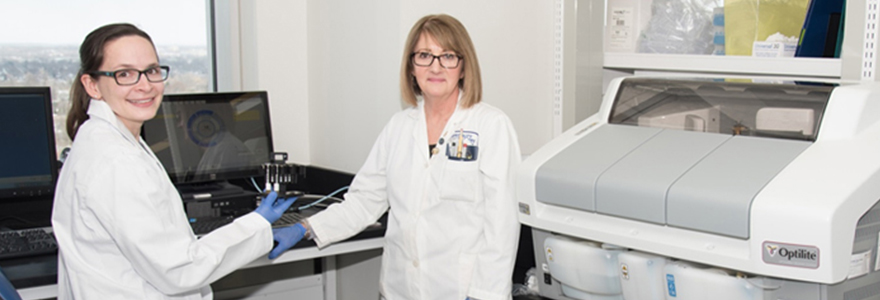Serum Protein Testing Innovations Improve Diagnostics

Pathology and Laboratory Medicine is pleased to announce that on January 19th, 2017 Clinical Immunology laboratory went live with the Optilite, a state-of-the-art automated bench top serum protein testing instrument, manufactured by The Binding Site. It is equipped with new features which eliminate the effects of sample variability.
We are the first health care provider in Canada to use the Optilite. Our method validation studies have shown improvement with both reproducibility and accuracy in the testing of many serum proteins. Investment in this new technology has allowed us to increase our test menu by making it possible to perform in-house new tests, such as IgG subclasses, C1 Esterase Inhibitor and Urine Beta 2 Microglobulin. We can now provide results for these new tests much faster and this translates into improved patient care.
Other key tests supported include:
- Serum Free Light Chain measurements help in the diagnosis of Multiple Myeloma, particularly Light Chain Myeloma, Non-Secretory Myeloma and AL amyloidosis. This assay is more sensitive than serum protein electrophoresis. Also, it evaluates the effectiveness of treatment as well as detects relapses earlier.
- C1 Esterase Inhibitor measurement aids in the diagnosis of hereditary and acquired Angioedema, a subcutaneous or submucosal swelling throughout the body. These two forms of the disease are clinically identical; however patients with the hereditary form have low levels of C1 Esterase Inhibitor and patients with the acquired form have normal levels.
- Beta-2 Microglobulin testing is used to aid in the diagnosis of kidney disease. Measurement of Beta-2 Microglobulin in both serum and urine can help differentiate between glomerular and tubular kidney diseases. An elevated urine level with a normal serum level may indicate a kidney tubular disorder. An increased serum level with a normal or low urine level is indicative of a kidney disorder due to glomerular dysfunction.
- Abnormal levels of any of the subclasses IgG1, IgG2, IgG3, IgG4; may be associated with different conditions, such as anaphylaxis, autoimmune diseases, and hypo and hypergammaglobuIinemia. Specifically, IgG2 deficiency in children may be associated with recurrent infections.
Any questions about this methodology can be directed to Dr Liju Yang at extension 35768.








